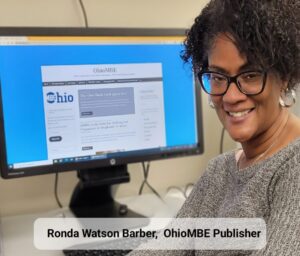By Ronda Watson Barber, Publisher, OhioMBE
I was extremely disappointed to hear a Black man in leadership — the Chief Operating Officer of Columbus City Schools — describe the district’s supplier diversity goals as “aspirational.” That statement is both inaccurate and disheartening. Board Policy 6400 – Community Inclusion (Local Economically Disadvantaged Enterprises) is not a wish list; it is a framework for action, accountability, and measurable results.
What the policy actually requires.
Policy 6400 affirms non-discrimination and adopts a LEDE Statement that seeks to “achieve the goal of awarding to LEDEs… at least twenty percent (20%) of all dollars spent on an annual basis” in district contracting and procurement. The policy makes clear the district will use race- and gender-neutral measures, requires good-faith efforts by contractors to locate and engage LEDEs, and directs the district to provide adequate staff, collect and analyze data, monitor progress, and issue periodic/semi-annual reviews to the Board. It also calls for a budget, staffing, and implementation proposal to put the policy into practice, plus a Workforce Participation Program with resident hiring goals and reporting. None of that is “aspirational.” It’s operational.
The numbers don’t match the mandate.
In FY25, Columbus City Schools reported $232.3 million in controllable spending, with $41.5 million (17.9%) going to LEDE vendors. While that’s an improvement from FY24, it still falls short of the 20% goal — and far below what should be expected from a majority-Black school district funded largely by Black taxpayers.
The Summer Capital Improvements Report is even more troubling: of $80.9 million in construction spending, only $4.6 million went to African-American firms, compared to $17.9 million to white-owned firms — a nearly 4-to-1 disparity. The LEDE program isn’t race-based, but white-owned vendors are benefiting most from a policy designed to expand opportunity for local, economically disadvantaged enterprises.
Why “aspirational” language harms participation.
- Weakens accountability. “Aspirational” invites “we tried” instead of results.
- Undermines equity. Goals that remedy disparities become symbolic gestures.
- Discourages vendors. Black and minority-owned firms hear “optional,” not “expected.” Many already face late payments, opaque processes, and heavy admin burdens; they need enforceable access, not hopeful rhetoric. Every missed outreach or unreturned call reinforces the belief that inclusion is performative.
- Dodges good-faith requirements. Policy 6400 requires good-faith efforts — documented outreach to LEDEs. “Aspirational” provides a loophole.
- Protects the status quo. It sounds progressive while avoiding structural change.
Unanswered questions that demand transparency.
Since September, I have repeatedly requested documentation of outreach activities and good-faith efforts tied to the summer construction spend. To date: no response. What outreach was done to engage minority- and women-owned firms? How were all vendors notified of opportunities? What roles did Capital Improvements, the Outreach Coordinator, and the COO play in meeting Policy 6400’s requirements — especially given the district now has both an Outreach Coordinator and a paid consultant?
Do the work the policy requires.
If Columbus City Schools is serious about equity, it must treat supplier inclusion as a performance standard — not a poem. Publish a public plan with timelines, restore robust outreach, document good-faith efforts, and issue quarterly reports showing who is getting the work, by category. That’s what accountability looks like.
Our businesses aren’t aspiring to succeed — we’re succeeding. It’s time for our public institutions to match that intention, discipline, and accountability.
just my thoughts…rwb
Discover more from OhioMBE
Subscribe to get the latest posts sent to your email.
